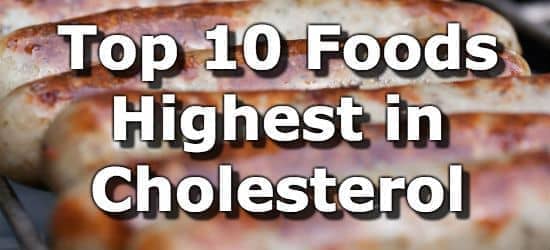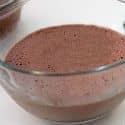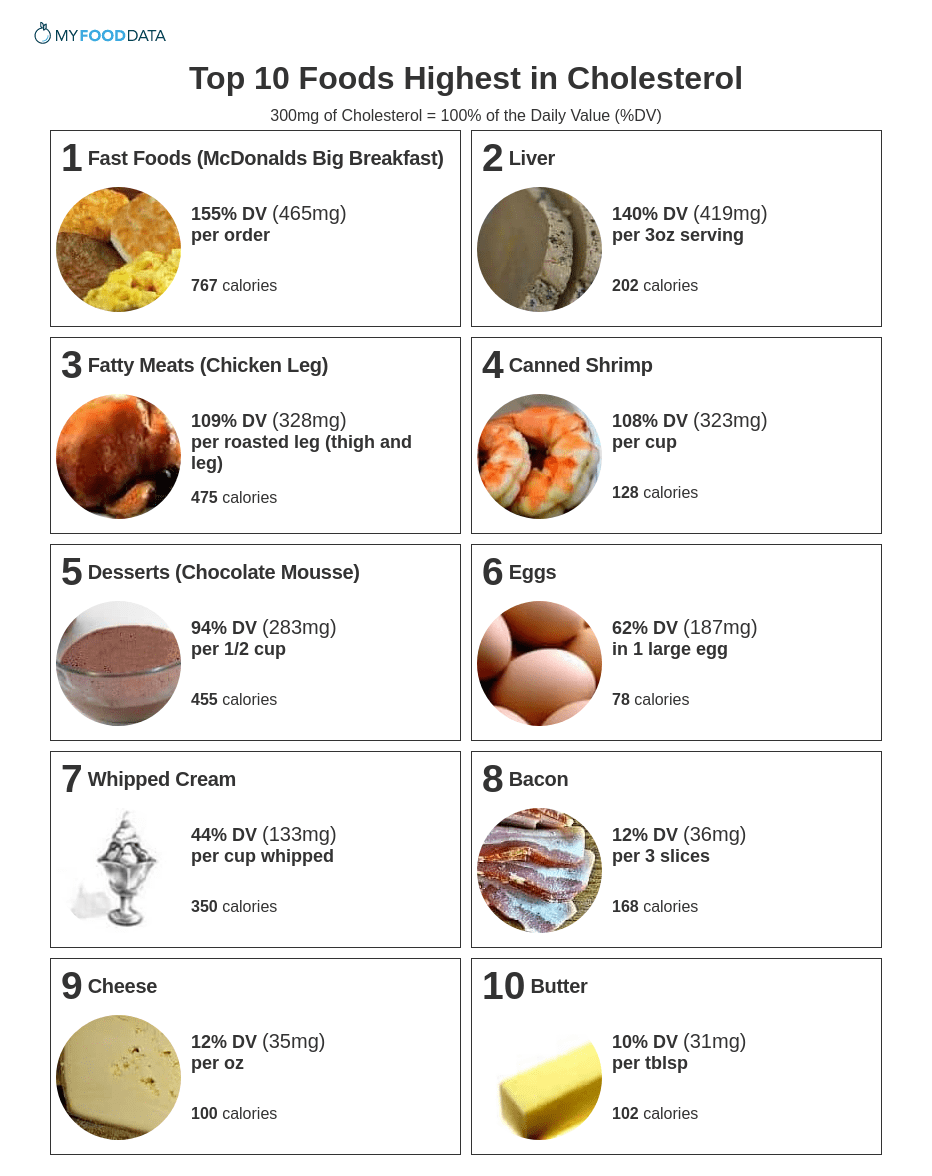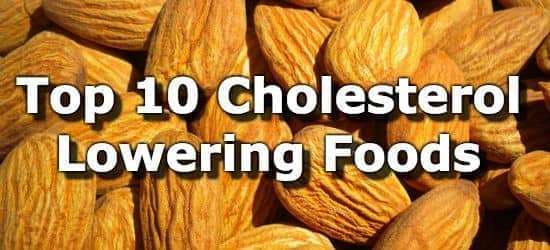Top 10 Foods Highest in Cholesterol

Cholesterol is a steroid lipid (fat) present in the blood, necessary for the proper functioning of cell membranes, the production of vitamin D, and the production of certain hormones.
Cholesterol deficiency is rare, as our bodies manufacture the cholesterol we need. High blood cholesterol levels, on the other hand, increase the risk of cardiovascular disease and other health problems. (1,2)
The effect of cholesterol foods on blood cholesterol levels is a matter of debate. Some studies find a link between dietary cholesterol and higher blood cholesterol, while other studies find no result. (3,4,5)
Dietary cholesterol is just one of many factors that contribute to blood cholesterol, and thus, it is difficult to isolate the effect of dietary cholesterol. (3,4,5) Certain groups of people, such as smokers, are more sensitive to dietary cholesterol. (5,6)
Eating a diet of healthy fats and fiber helps to lower cholesterol. (7,8)
Foods high in cholesterol include fast foods, liver, fatty meats, canned shrimp, desserts, eggs, whipped cream, bacon, cheese, and butter. The current daily value (DV) for cholesterol is 300mg. (9)
Below is a list of high-cholesterol foods sorted by a common serving size. To lower your cholesterol, read the article on cholesterol lowering foods, and foods to avoid for a healthy heart.
- Introduction
- List of Foods Highest in Cholesterol
- Printable
- High Risk Groups for High Blood Cholesterol
- What Foods Lower Cholesterol?
- Does Saturated Fat Increase Blood Cholesterol?
- Do Hydrogenated Fats Increase Cholesterol?
- What Lifestyle Habits Help Lower Cholesterol?
- Lists By Food Group
- References
List of Foods Highest in Cholesterol
-
 1. Fast Foods (McDonalds Big Breakfast) + Add
1. Fast Foods (McDonalds Big Breakfast) + Add
Cholesterol
per OrderCholesterol
per 100gCholesterol
per 200 Calories465mg
(155% DV)173mg
(58% DV)121mg
(40% DV)More Fast Foods High in Cholesterol
- 118% DV in an egg and bacon biscuit
- 63% DV in a Double Whopper with Cheese
See all fast foods high in cholesterol.
-
 2. Liver + Add
2. Liver + Add
Cholesterol
per 3oz ServingCholesterol
per 100gCholesterol
per 200 Calories419mg
(140% DV)493mg
(164% DV)414mg
(138% DV) -
 3. Fatty Meats (Chicken Leg) + Add
3. Fatty Meats (Chicken Leg) + Add
Cholesterol
per Roasted Leg (Thigh And Leg)Cholesterol
per 100gCholesterol
per 200 Calories328mg
(109% DV)127mg
(42% DV)138mg
(46% DV)More Fatty Meats High in Cholesterol
- 59% DV in a pork chop with fat
- 42% DV in a rack of pork spare ribs
- 40% DV in a single chicken wing
See the full list of high cholesterol meats.
-
 4. Canned Shrimp + Add
4. Canned Shrimp + Add
Cholesterol
per CupCholesterol
per 100gCholesterol
per 200 Calories323mg
(108% DV)252mg
(84% DV)504mg
(168% DV)Shrimp, like all seafood, have a high omega 3 to omega 6 ratio, and may help increase good cholesterol (HDLs) while lowering bad cholesterol (LDLs).
-
 5. Desserts (Chocolate Mousse) + Add
5. Desserts (Chocolate Mousse) + Add
Cholesterol
per 1/2 CupCholesterol
per 100gCholesterol
per 200 Calories283mg
(94% DV)140mg
(47% DV)124mg
(41% DV)More High Cholesterol Desserts
- 39% DV in 1/2 cup of egg custard
- 33% DV in 1/2 cup of ice-cream
- 25% DV in a cream filled eclair
-
 6. Eggs + Add
6. Eggs + Add
Cholesterol
in 1 Large EggCholesterol
per 100gCholesterol
per 200 Calories187mg
(62% DV)373mg
(124% DV)481mg
(160% DV)While eggs do contain cholesterol, they are not believed to raise cholesterol levels as part of a balanced diet. If you have high cholesterol, limiting yourself to 1 egg per day is advisable as a precautionary measure.
-
 7. Whipped Cream + Add
7. Whipped Cream + Add
Cholesterol
per Cup WhippedCholesterol
per 100gCholesterol
per 200 Calories133mg
(44% DV)111mg
(37% DV)76mg
(25% DV)More Dairy Foods High in Cholesterol
- 16% DV in a 16oz glass of whole milk
- 11% DV in a cup of whole yogurt
See the full list of dairy foods high in cholesterol.
-
 8. Bacon + Add
8. Bacon + Add
Cholesterol
per 3 SlicesCholesterol
per 100gCholesterol
per 200 Calories36mg
(12% DV)99mg
(33% DV)42mg
(14% DV)Other Processed Meats High in Cholesterol
- 27% DV in 3oz of pepperoni
- 21% DV in a pork bratwurst sausage
-
 9. Cheese (Port De Salut) + Add
9. Cheese (Port De Salut) + Add
Cholesterol
per OzCholesterol
per 100gCholesterol
per 200 Calories35mg
(12% DV)123mg
(41% DV)70mg
(23% DV)More Cheese High in Cholesterol
- 20% DV in a 1/2 cup of Ricotta cheese
- 11% DV per oz of Gouda
- 10% DV per oz of Gruyere
- 10% DV per oz of Hard Goat Cheese
- 9% DV per oz of Brie
- 9% DV per oz of Cheddar
See the full list of dairy foods high in cholesterol.
-
 10. Butter + Add
10. Butter + Add
Cholesterol
per TblspCholesterol
per 100gCholesterol
per 200 Calories31mg
(10% DV)215mg
(72% DV)60mg
(20% DV)
Printable One Page Sheet

High Risk Groups for High Blood Cholesterol
- Individuals with a family history of high cholesterol (Familial Hypercholesterolemia) - Regulation of blood cholesterol levels is hereditary and it is advisable to find out if relatives have high cholesterol levels. (10,11)
- Older Adults - Cholesterol levels decline between the ages of 10-20 years old, but then rise after that. Men reach peak cholesterol levels between the ages of 50-60 and then plateau. Women reach peak levels between the ages of 60-70 and then plateau after. (12)
- Over-weight Individuals - Being over-weight increases risk of heart disease and correlates with high cholesterol levels. (13,14)
- People with Low Physical Activity Levels - Exercise is an effective way to lower bad cholesterol levels (LDLs) and raise good cholesterol levels (HDLs). People who are not physically active are more likely to have high cholesterol levels. (15,16)
- High Blood Pressure - High blood pressure is correlated with higher blood cholesterol. It is difficult to tell if high blood pressure is the cause, or related lifestyle factors such as smoking, stress, and lack of exercise. (17,18)
- Smokers - Smoking is associated with 10-18% higher blood cholesterol levels. There is even a dose-response effect where the more people smoke tobacco the higher their cholesterol. (19)
What Foods Lower Cholesterol?
Blood cholesterol can be lowered with dietary changes. Foods that lower cholesterol include healthy fats, oat bran, flax seeds, garlic, almonds, walnuts, whole barley, and green tea. For more, see the article on cholesterol-lowering foods.
Does Saturated Fat Increase Blood Cholesterol?
The relationship between saturated fat and blood cholesterol is a source of much controversy. In recent times, new studies suggest that the relationship between saturated fat and blood cholesterol is not as strong as thought. (20,21)
The recommendation to replace saturated fat with refined carbohydrates also made the problem worse. Instead, saturated fats should be substituted with poly-unsaturated fatty acids (PUFAs) and whole grains which do reduce cholesterol. (22,23,24)
Further, not all saturated fats are created equal. Saturated fats from plant foods like coconut and chocolate will likely confer more health benefits than saturated fats from heavy cream and processed meats.
Do Hydrogenated Fats Increase Cholesterol?
Another result of previous advice to avoid foods high in saturated fats led to the creation of hydrogenated fats. Hydrogenation adds hydrogen to previously unsaturated fats. The result creates oils that are solid at room temperature and have a much longer shelf life.
Hydrogenated fats became a component of margarine and butter substitutes and also a component of a wide array of shelf-stable processed foods.
Data subsequently showed a high correlation between hydrogenated fats and higher blood cholesterol levels, as well as increased risk of cardiovascular disease. (25,26,27) Numerous governments now ban the use of partially hydrogenated oils and fats. (28) In 2015 the US FDA also released the determination that partially hydrogenated fats are not safe and pose a public health risk. (29)
Despite the bans it is still possible to occasionally see products with "partially hydrogenated" ingredients. Be sure to check labels and avoid such products.
What Lifestyle Habits Help Lower Cholesterol?
From the Nutrient Ranking Tool
Use the ranking tool links below to select foods and create your own food list to share or print.
- Foods High in Cholesterol
- Foods Low in Cholesterol
- Vegetarian Foods High in Cholesterol
- Dairy High in Cholesterol
- Breakfast Cereals High in Cholesterol
- Fast Foods High in Cholesterol
View more nutrients with the nutrient ranking tool, or see ratios with the nutrient ratio tool.
Related
Data Sources and References
- Abdullah SM, Defina LF, Leonard D, Barlow CE, Radford NB, Willis BL, Rohatgi A, McGuire DK, de Lemos JA, Grundy SM, Berry JD, Khera A. Serum Cholesterol Levels and Risk of Cardiovascular Death: A Systematic Review and a Dose-Response Meta-Analysis of Prospective Cohort Studies Circulation. 2018 Nov 20;138(21):2315-2325. doi: 10.1161/CIRCULATIONAHA.118.034273. 30571575
- Backholer K, Peters SAE, Bots SH, Peeters A, Huxley RR, Woodward M. Total cholesterol as a risk factor for coronary heart disease and stroke in women compared with men: A systematic review and meta-analysis J Epidemiol Community Health. 2017 Jun;71(6):550-557. doi: 10.1136/jech-2016-207890. Epub 2016 Dec 14. 27974445
- Ghafoorunissa. Does Dietary Cholesterol Matter? Natl Med J India. 2009 May-Jun;22(3):126-32. 19764688
- Eckel RH. Dietary cholesterol and cardiovascular disease: a systematic review and meta-analysis Am J Clin Nutr. 2015 Aug;102(2):235-6. doi: 10.3945/ajcn.115.116905. Epub 2015 Jul 15. 26178728
- Oliver MF. Dietary cholesterol, atherosclerosis and coronary heart disease Hum Nutr Clin Nutr. 1982;36(6):413-27. 6298152
- Criqui MH, Wallace RB, Heiss G, Mishkel M, Schonfeld G, Jones GT. Cigarette smoking and plasma cholesterol Circulation. 1980 Nov;62(4 Pt 2):IV70-6. 7418146
- [No authors listed] Effect of a diet enriched with monounsaturated or polyunsaturated fatty acids on levels of low-density and high-density lipoprotein cholesterol in healthy women and men N Engl J Med. 1990 Feb 8;322(6):402-4. doi: 10.1056/NEJM199002083220612. 2300094
- Anderson JW, Story L, Sieling B, Chen WJ, Petro MS, Story J. Oat-bran intake selectively lowers serum low-density lipoprotein cholesterol concentrations of hypercholesterolemic men Am J Clin Nutr. 1984 Dec;40(6):1146-55. doi: 10.1093/ajcn/40.6.1146. 6095635
- U.S.FDA - Daily Value on the New Nutrition and Supplement Facts Labels
- Vrablík M, Vaclová M, Tichý L, Soška V, Bláha V, Fajkusová L, Češka R, Šatný M, Freiberger T. Genetics of Familial Hypercholesterolemia: New Insights Physiol Res. 2017 Apr 5;66(Suppl 1):S1-S9. doi: 10.33549/physiolres.933600. 28379025
- Paththinige CS, Rajapakse JRDK, Constantine GR, Sem KP, Singaraja RR, Jayasekara RW, Dissanayake VHW. Genetic determinants of inherited susceptibility to hypercholesterolemia - a comprehensive literature review Lipids Health Dis. 2018 May 2;17(1):100. doi: 10.1186/s12944-018-0763-z. 29720182
- Hazzard WR. Cholesterol metabolism and aging Geriatrics. 1985 Jan;40(1):42-51, 54. 3965355
- Stamler J. Excess body weight. An underrecognized contributor to high blood cholesterol levels in white American men Arch Intern Med. 1993 May 10;153(9):1040-4. 8481071
- Swift DL, Houmard JA, Slentz CA, Kraus WE. Effects of weight loss in overweight/obese individuals and long-term lipid outcomes--a systematic review PLoS One. 2018 May 18;13(5):e0196637. doi: 10.1371/journal.pone.0196637. eCollection 2018. 29775461
- Crichton GE, Alkerwi A. Physical activity, sedentary behavior time and lipid levels in the Observation of Cardiovascular Risk Factors in Luxembourg study PLoS One. 2014 Jun 12;9(6):e99829. doi: 10.1371/journal.pone.0099829. eCollection 2014. 24925084
- Tambalis K, Panagiotakos DB, Kavouras SA, Sidossis LS. Differential effects of aerobic exercise, resistance training and combined exercise modalities on cholesterol and the lipid profile: review, synthesis and recommendations Angiology. 2009 Oct-Nov;60(5):614-32. doi: 10.1177/0003319708324927. Epub 2008 Oct 30. 18974201
- Bønaa KH, Arnesen E. Association between blood pressure and serum lipids in a population. The Tromsø Study Circulation. 1992 Aug;86(2):394-405. doi: 10.1161/01.cir.86.2.394. 1638708
- Holme I, Helgeland A, Hjermann I, Leren P, Lund-Larsen PG. The association between blood pressure and serum cholesterol in healthy men: the Oslo study Am J Epidemiol. 1980 Jul;112(1):149-60. doi: 10.1093/oxfordjournals.aje.a112965. 7395850
- Cade J, Margetts B. Cigarette smoking and serum lipid and lipoprotein concentrations: an analysis of published data BMJ. 1989 May 13;298(6683):1312. doi: 10.1136/bmj.298.6683.1312-a. 2500214
- Siri-Tarino PW, Sun Q, Hu FB, Krauss RM. Saturated Fat: Part of a Healthy Diet Am J Clin Nutr. 2010 Mar;91(3):502-9. doi: 10.3945/ajcn.2008.26285. Epub 2010 Jan 20. 20089734
- Toeller M, Buyken AE, Heitkamp G, Scherbaum WA, Krans HM, Fuller JH. Combined effects of saturated fat and cholesterol intakes on serum lipids: Tehran Lipid and Glucose Study Exp Clin Endocrinol Diabetes. 1999;107(8):512-21. doi: 10.1055/s-0029-1232560. 10612482
- [No authors listed] Perspective: The Saturated Fat-Unsaturated Oil Dilemma: Relations of Dietary Fatty Acids and Serum Cholesterol, Atherosclerosis, Inflammation, Cancer, and All-Cause Mortality Adv Nutr. 2021 Oct 1;12(5):2040. doi: 10.1093/advances/nmab091. 34595505
- [No authors listed] Effect of a diet enriched with monounsaturated or polyunsaturated fatty acids on levels of low-density and high-density lipoprotein cholesterol in healthy women and men N Engl J Med. 1990 Feb 8;322(6):402-4. doi: 10.1056/NEJM199002083220612. 2300094
- Anderson JW, Story L, Sieling B, Chen WJ, Petro MS, Story J. Oat-bran intake selectively lowers serum low-density lipoprotein cholesterol concentrations of hypercholesterolemic men Am J Clin Nutr. 1984 Dec;40(6):1146-55. doi: 10.1093/ajcn/40.6.1146. 6095635
- Lichtenstein AH, Erkkilä AT, Lamarche B, Schwab US, Jalbert SM, Ausman LM. Impact of hydrogenated fat on high density lipoprotein subfractions and metabolism Atherosclerosis. 2003 Nov;171(1):97-107. doi: 10.1016/j.atherosclerosis.2003.07.005. 14642411
- Holub BJ. Effects of different forms of dietary hydrogenated fats on serum lipoprotein cholesterol levels N Engl J Med. 1999 Oct 28;341(18):1396-7. doi: 10.1056/NEJM199910283411812. 10577089
- Mozaffarian D, Abdollahi M, Campos H, Houshiarrad A, Willett WC. [Trans-fatty acids--effects on coronary heart disease] Eur J Clin Nutr. 2007 Aug;61(8):1004-10. doi: 10.1038/sj.ejcn.1602608. Epub 2007 Jan 31. 17268422
- Resnik D. Trans fat bans and human freedom Am J Bioeth. 2010 Mar;10(3):W4-5. doi: 10.1080/15265161003708557. 20229403
- U.S.FDA - Final Determination Regarding Partially Hydrogenated Oils (Removing Trans Fat)
- Ros E. Plant-based diets and cardiovascular health Trends Cardiovasc Med. 2018 Oct;28(7):442-444. doi: 10.1016/j.tcm.2018.04.008. Epub 2018 May 9. 29793834
- Geisler BP. The Mediterranean diet, its components, and cardiovascular disease Am J Med. 2016 Jan;129(1):e11. doi: 10.1016/j.amjmed.2015.04.046. 26703006
- Guasch-Ferré M, Salas-Salvadó J, Ros E, Estruch R, Corella D, Fitó M, Martínez-González MA; PREDIMED Investigators. The Mediterranean Diet and Cardiovascular Health Nutr Metab Cardiovasc Dis. 2017 Jul;27(7):624-632. doi: 10.1016/j.numecd.2017.05.004. Epub 2017 Jun 10. 28684083
- Bellettiere J, LaMonte MJ, Evenson KR, Rillamas-Sun E, Kerr J, Lee IM, Di C, Rosenberg DE, Stefanick M, Buchner DM, Hovell MF, LaCroix AZ. Effect of Sedentary Lifestyle on Cardiovascular Disease Risk Among Healthy Adults With Body Mass Indexes 18.5 to 29.9 kg/m2 Circulation. 2019 Feb 19;139(8):1036-1046. doi: 10.1161/CIRCULATIONAHA.118.035312. 31031411
- Carević V, Rumboldt M, Rumboldt Z; Interheart Investigators. Smoking and cardiovascular disease Acta Med Croatica. 2007 Jun;61(3):299-306. 17629106
- O'Keefe EL, DiNicolantonio JJ, O'Keefe JH, Lavie CJ. Alcohol and cardiovascular health: the dose makes the poison…or the remedy Prog Cardiovasc Dis. 2018 May-Jun;61(1):68-75. doi: 10.1016/j.pcad.2018.02.001. Epub 2018 Feb 16. 29458056
- Huang Y, Hu Y, Mai W. Stress and cardiovascular disease Nat Rev Cardiol. 2012 Oct;9(10):598; author reply 598. doi: 10.1038/nrcardio.2012.45-c1. Epub 2012 Aug 14. 22889951
- Wirtz PH, Ehlert U, Bärtschi C, Redwine LS, von Känel R. Acute cholesterol responses to mental stress and change in posture Metabolism. 2009 Jan;58(1):30-7. doi: 10.1016/j.metabol.2008.08.003. 19059528
- Zhang J, Cai A, Chen G, Wang X, Cai M, Li H, Nissen SE, Lip GYH, Lin H. Associations of habitual fish oil supplementation with cardiovascular outcomes and all cause mortality: evidence from a large population based cohort study Eur J Prev Cardiol. 2022 Oct 20;29(14):1911-1920. doi: 10.1093/eurjpc/zwac192. 36047058
- Lavie CJ, Milani RV, Mehra MR, Ventura HO. Omega-3 polyunsaturated fatty acid in primary and secondary cardiovascular disease prevention J Am Coll Cardiol. 2009 Aug 11;54(7):585-94. doi: 10.1016/j.jacc.2009.02.084. 19660687
Simplify Nutrition Tracking with MyFoodData!
Speedy Tools and Detailed Data FREEEasily analyze your meals to find the best foods for your goals.
✅ Use our recipe nutrition calculator and nutrition comparison tool.
✅ Access expert nutrition data tools and in-depth articles.
✅ Log foods and organize your recipes with a free account.


 Next ➞
Next ➞
